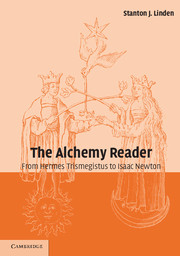Book contents
- Frontmatter
- Contents
- List of illustrations
- Acknowledgments
- List of abbreviations
- Illustrations
- Introduction
- Part I Ancient texts
- Part II Islamic and medieval texts
- 10 KHALID IBN YAZID (635-c. 704): From Secreta Alchymiœ
- 11 JABIR IBN HAYYAN (eighth century)/PSEUDO-GEBER (thirteenth century): From Of the Investigation or Search of Perfection; Of the Sum of Perfection; and His Book of Furnaces
- 12 AVICENNA (c. 980-1037) De Congelatione et Conglutinatione Lapidum
- 13 ALBERTUS MAGNUS (1193? or 1206?–1280): From the Libellus de Alchimia
- 14 ROGER BACON (c. 1219–c. 1292): From the Radix Mundi
- 15 NICOLAS FLAMEL (1330?–1417?): From His Exposition of the Hieroglyphical Figures
- 16 BERNARD, EARL OF TREVISAN (fl. late fourteenth century): A Treatise of the Philosopher's Stone
- 17 GEORGE RIPLEY (1415–1490): The Epistle of George Ripley written to King Edward IV
- Part III Renaissance and seventeenth-century texts
- Glossary
- Bibliography
- Index
10 - KHALID IBN YAZID (635-c. 704): From Secreta Alchymiœ
Published online by Cambridge University Press: 05 October 2014
- Frontmatter
- Contents
- List of illustrations
- Acknowledgments
- List of abbreviations
- Illustrations
- Introduction
- Part I Ancient texts
- Part II Islamic and medieval texts
- 10 KHALID IBN YAZID (635-c. 704): From Secreta Alchymiœ
- 11 JABIR IBN HAYYAN (eighth century)/PSEUDO-GEBER (thirteenth century): From Of the Investigation or Search of Perfection; Of the Sum of Perfection; and His Book of Furnaces
- 12 AVICENNA (c. 980-1037) De Congelatione et Conglutinatione Lapidum
- 13 ALBERTUS MAGNUS (1193? or 1206?–1280): From the Libellus de Alchimia
- 14 ROGER BACON (c. 1219–c. 1292): From the Radix Mundi
- 15 NICOLAS FLAMEL (1330?–1417?): From His Exposition of the Hieroglyphical Figures
- 16 BERNARD, EARL OF TREVISAN (fl. late fourteenth century): A Treatise of the Philosopher's Stone
- 17 GEORGE RIPLEY (1415–1490): The Epistle of George Ripley written to King Edward IV
- Part III Renaissance and seventeenth-century texts
- Glossary
- Bibliography
- Index
Summary
The Islamic rise to political and military power beginning in the seventh century had important consequences for the study and practice of alchemy. With the conquest of Alexandria (642) and other centers of Greek learning, the Moslems came into possession of the bulk of Greek philosophy and science, including alchemy. Thus, the writings of the Greeks became the basis for Moslem advancements in the field, and Arabian scholars helped extend the knowledge of alchemy in the West through preserving, translating, and transmitting the Greek heritage.
Khalid (Khalid ibn Yazid) of Damascus was among the first of the Moslem scholars to take a serious interest in alchemy. Under his direction, Arabian translations of Greek and Coptic treatises were completed. He is also said to have personally studied alchemy under the tutelage of the Christian scholar Morienus – himself a pupil of Stephanos of Alexandria – and to have written alchemical poems (Holmyard 64). The Secreta Alchymiœ is a reasonably clear and comprehensive summary of topics and themes that were to become central in alchemical writing in the West, including certain of its primary processes, relations between the body and soul of metals, degrees of fire, laboratory equipment, and the preparation of both the white and the red stones.
The following selections from the Secreta Alchymiœ are taken from Kalidis Persici, Secreta Alchymiœ. Written Originally in Hebrew, and Translated thence into Arabick, and out of Arabick into Latin: Now faithfully rendred into English, By William Salmon, printed in Salmon's Medicina Practica (1692).
- Type
- Chapter
- Information
- The Alchemy ReaderFrom Hermes Trismegistus to Isaac Newton, pp. 71 - 79Publisher: Cambridge University PressPrint publication year: 2003



